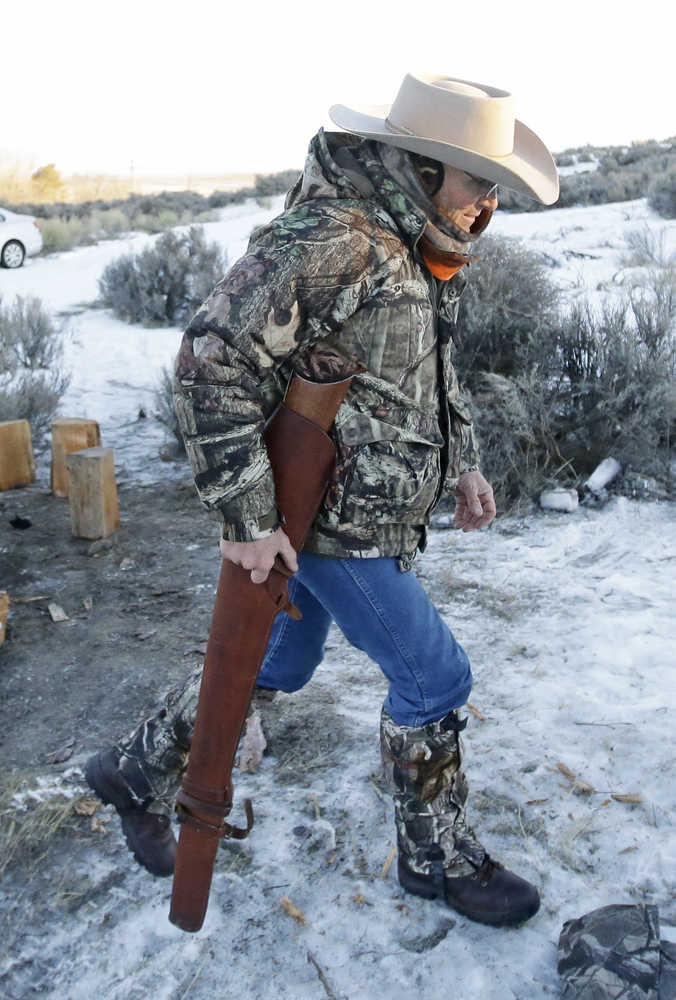BURNS, Ore. — A leader of the Oregon Indian tribe whose ancestral property is being occupied by an armed group opposed to federal land policy said Wednesday that the group is not welcome and needs to leave.
“The protesters have no right to this land. It belongs to the native people who live here,” Charlotte Rodrique told reporters at the tribe’s cultural center.
Rodrique, who is tribal chair for the Burns Paiute, said the tribe is concerned cultural artifacts could be damaged and accused the group of “desecrating one of our sacred sites.”
“Armed protesters don’t belong here,” she said.
The group seized buildings at the Malheur National Wildlife Refuge in eastern Oregon’s high desert country on Saturday. Authorities had not yet moved to remove the group of roughly 20 people.
Rodrique said the area was a wintering ground for the Paiute people prior to the coming of settlers, ranchers and trappers. She said the tribe signed a treaty in 1868 with the federal government, and though the U.S. Senate never approved it, she expected the government to honor the agreement to protect their interests.
The group occupying a remote national wildlife preserve in Oregon has said repeatedly that local people should control federal lands.
Leader Ammon Bundy told reporters Tuesday that the group would leave when there was a plan in place to turn over federal lands to locals — a common refrain in a decades-long fight over public lands in the West.
“It is our goal to get the logger back to logging, the rancher back to ranching,” said the son of Nevada rancher Cliven Bundy, who was involved in a high-profile 2014 standoff with the government over grazing rights.
Rodrique said she “had to laugh” at that statement, because she knew Bundy wasn’t talking about giving the land back to the tribe.
“We have no sympathy for those who are trying to take the land from its rightful owners,” she said.
Arizona rancher LaVoy Finicum, one of the group members, said Tuesday evening that he believes federal officials have issued warrants for the arrest of five group members — including himself and Ammon Bundy — but Finicum offered no details.
The FBI in Portland referred calls to the Harney County Joint Information Center, which said in a statement that it had no information on arrests or arrest warrants and that authorities were “still working on a peaceful resolution.”
Bundy said group members would take a defensive position anticipating a possible raid. Late Tuesday, they moved a large plow vehicle to block the refuge’s driveway.
The younger Bundy’s anti-government group is critical of federal land stewardship. But environmentalists and others say U.S. officials should keep control for the broadest possible benefit to business, recreation and the environment.
Randy Eardley, a Bureau of Land Management spokesman, said the group’s call for land ownership transfer didn’t make sense.
“It is frustrating when I hear the demand that we return the land to the people, because it is in the people’s hand — the people own it,” Eardley said. “Everybody in the United States owns that land. … We manage it the best we can for its owners, the people, and whether it’s for recreating, for grazing, for energy and mineral development.”
The federal government controls about half of all land in the West, which would make the wholesale transfer of ownership extremely difficult and expensive.
For example, it owns 53 percent of Oregon, 85 percent of Nevada and 66 percent of Utah, according to the Congressional Research Service. Taking over federal public lands in Idaho could cost the state $111 million a year, according to a University of Idaho study.
Bundy said the group felt it had the support of the local community. But the county sheriff has told the group to go home, and many locals don’t want them around, fearing they may bring trouble. A community meeting was scheduled for later Wednesday.
The group calling itself Citizens for Constitutional Freedom said it wants an inquiry into whether the government is forcing ranchers off their land after Dwight Hammond and his son, Steven, reported back to prison Monday.
The Hammonds, who have distanced themselves from the group, were convicted of arson three years ago and served no more than a year. A judge later ruled that the terms fell short of minimum sentences requiring them to serve about four more years.
Such land disputes date back decades in the West. In the 1970s, Nevada and other states pushed for local control in what was known as the Sagebrush Rebellion. Supporters wanted more land for cattle grazing, mining and timber harvesting.

